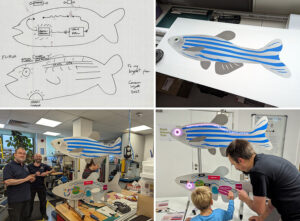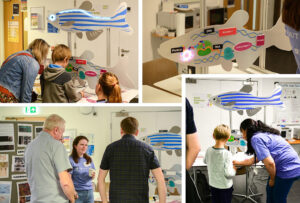Lighting up the Dark Genome Fish


Left to Right: Richard Wroblewski, Charli Corcoran, Shipra Bhatia, Connor Warnock, Cameron Wyatt, Helen Nickerson, Peter Hickey and Grace Alston
Doors Open Day 2023 marked the first outing of our new public engagement activity at the Institute of Genetics and Cancer – the Dark Genome Fish.
This project has been a fantastic collaboration between our research scientists, zebrafish facility staff and workshop and graphics teams. The result is a 4-foot model zebrafish (somewhat larger that the 4cm size of actual zebrafish!), with magnetic attachments that add together to complete a circuit. The design reflects how parts of the DNA work together, making proteins when and where they are needed in the body.

Zebrafish are a fantastic model organism to use in genetics research. We share an amazing 70% of our genes with zebrafish, and so we also share a lot of our fundamental biology. A pair of zebrafish can lay hundreds of eggs a day, and we can track the developmental processes happening in each of those eggs using live imaging.
Our aim at the Institute of Genetics and Cancer (IGC) is to understand how mutations in our DNA cause disease. Many IGC researchers, including my research group, are focussing on the Dark Genome, a term that describes the large swathes of our DNA that are particularly poorly understood, but that have many disease-associated mutations.

In my PhD, I am studying mutations in ‘enhancers’. As the name suggests, enhancers are pieces of DNA that enhance or turn-on genes, often in a specific part of the body. For example, I study an enhancer that turns on a gene only in the developing eye (and, importantly, nowhere else!).
By introducing DNA into the zebrafish that makes fluorescent proteins, we can track where genes are turned on and off by enhancers. We can therefore also track which mutations break the enhancers, stopping genes being turned on and off. This is not unlike seeing the colourful “proteins” that are made in our giant zebrafish model!
Part of the hands-on activity involves testing a number of different enhancers – each enhancer turns on the gene in a different part of the zebrafish body (the eye, the heart or the spinal cord). We also have an enhancer with a “mutation”, and introducing this into the circuit stops the gene being expressed. This allows visitors to do their own investigations – with all the frustrations and excitement experienced by a PhD student!
We had some fantastic feedback from the public at our Doors Open Day, reflecting on how zebrafish can be a really useful model organism and what we are learning about our own genetics.
The Zebrafish Team are bringing the Dark Genome Fish to the Edinburgh Science Festival 2024, running Zebrafish! A Splash of Science and Art at the National Museum of Scotland on Friday 5th April 2024!
If you are interested in building your own interactive zebrafish model, please contact our public engagement team for more information.
To learn more about Dark Genome work at the Institute of Genetics and Cancer, read this news update from January 2024.



